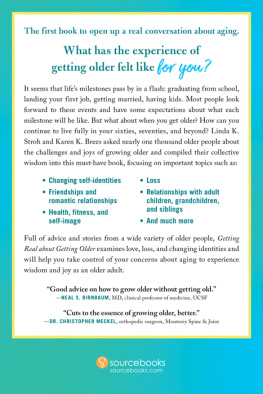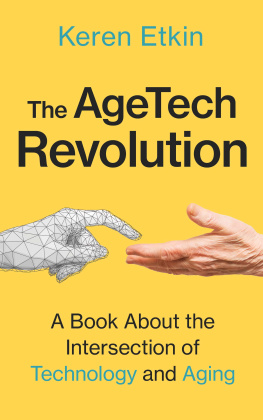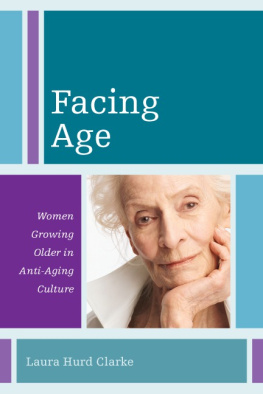Joan T. Erber - Aging and Older Adulthood
Here you can read online Joan T. Erber - Aging and Older Adulthood full text of the book (entire story) in english for free. Download pdf and epub, get meaning, cover and reviews about this ebook. City: Hoboken, year: 2019, publisher: Wiley-Blackwell, genre: Science. Description of the work, (preface) as well as reviews are available. Best literature library LitArk.com created for fans of good reading and offers a wide selection of genres:
Romance novel
Science fiction
Adventure
Detective
Science
History
Home and family
Prose
Art
Politics
Computer
Non-fiction
Religion
Business
Children
Humor
Choose a favorite category and find really read worthwhile books. Enjoy immersion in the world of imagination, feel the emotions of the characters or learn something new for yourself, make an fascinating discovery.
- Book:Aging and Older Adulthood
- Author:
- Publisher:Wiley-Blackwell
- Genre:
- Year:2019
- City:Hoboken
- Rating:5 / 5
- Favourites:Add to favourites
- Your mark:
Aging and Older Adulthood: summary, description and annotation
We offer to read an annotation, description, summary or preface (depends on what the author of the book "Aging and Older Adulthood" wrote himself). If you haven't found the necessary information about the book — write in the comments, we will try to find it.
Reflects the most important theoretical foundations and research directions concerning aging and older adulthood
This authoritative volume provides the latest insights into, and theoretical interpretation of, our understanding of the human aging process. Newly updated and revised, this edition of the well-established student textbook offers relatable scenarios that touch upon real-world issues faced by older adults and their families. The book explains how research studies attempt to answer questions of both theoretical and practical importance as they relate to aging and older adulthood, and it explains the hypotheses and findings of the studies in a manner that is comprehensible to readers of all levels of research experience.
Aging and Older Adulthood begins by describing the demographic characteristics of the older population, and follows with a chapter on theoretical models that apply to the study of adult development and aging, as well as approaches commonly taken to conduct research and ethical concerns involved in the study of this group. It then offers a series of chapters exploring biological aging, sensation perception and attention, memory, intellectual functioning, cognition and real-world problem-solving, personality and coping, social interaction and social ties, lifestyles and retirement, mental health and psychotherapy, and death and bereavement. The final chapter looks at aging in the future. Each chapter includes fully updated research findings, as well as new and expanded coverage of concepts and ideas in areas such as neuroscience, and diabetes.
- New edition of a highly respected text exploring our contemporary understanding of a broad range of topics related to older adulthood and the psychology of aging
- Offers thematic treatment of core issues including health, sensory perception, memory, intellect, social interactions, employment and retirement, and mental health
- Uses a dual lens of two models the selective optimization with compensation model and the ecological model to provide cohesiveness to the presentation of both theoretical and applied material
- Introduces each chapter with a relevant real-world scenario and refers back to it throughout the chapter
- Includes pedagogical feature boxes that reflect current understanding of contemporary issues in the field as well as key points and issues for further discussion
Aging and Older Adulthood, 4th Edition is an excellent text for upper division undergraduate and graduate courses focusing on the older adulthood and aging, the psychology of aging, gerontological studies, and lifespan development.
Joan T. Erber: author's other books
Who wrote Aging and Older Adulthood? Find out the surname, the name of the author of the book and a list of all author's works by series.







